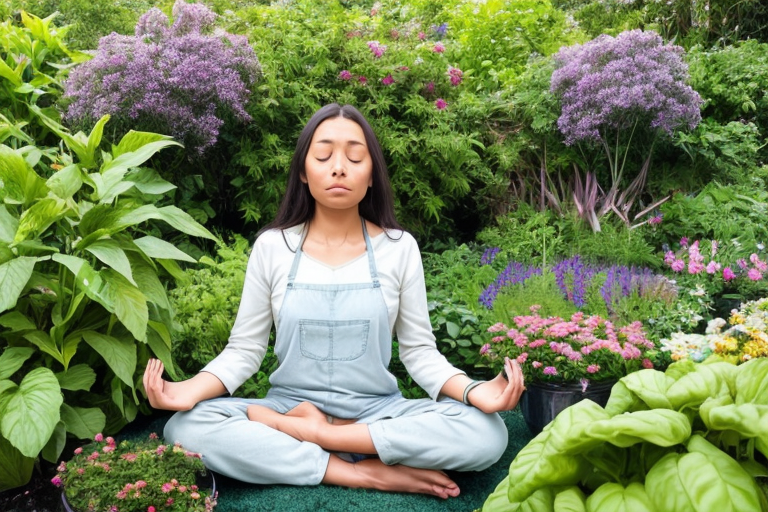The Healing Power of Gardening
Gardening has been known to have a positive impact on mental health. It is a therapeutic activity that can help reduce anxiety, depression, and stress. Studies have shown that gardening can improve mood, increase self-esteem, and provide a sense of accomplishment. With the current state of the world, it is more important than ever to explore ways to improve our mental health. Gardening is an excellent way to do so.
Research has shown that spending time in nature can soothe and calm the mind. Being surrounded by greenery and living organisms can have a positive impact on mental health. In fact, studies have shown that spending time in nature can reduce stress and anxiety. Gardening is an excellent way to connect with nature and reap the benefits of its healing power.
Nurturing plants can be a rewarding experience. Watching plants grow and thrive can provide a sense of satisfaction and joy. Gardening can also provide a sense of personal accomplishment. As you watch your plants grow, you can feel a sense of pride in knowing that you played a role in their growth. This can promote feelings of self-worth and improve overall mental health.
Gardening can also be a social activity. Community gardening is a great way to connect with others and foster a sense of belonging. Gardening with others can be a shared experience that brings people together. It can also be a way to learn from others and share knowledge about gardening. The social benefits of gardening with others can have a positive impact on mental health.
If you are interested in starting a garden, it is important to start small and build up. Choose the right plants for a beginner and make sure to do your research. There are many resources and support available for those who are new to gardening. Starting a garden can be a fun and rewarding experience that can have a positive impact on mental health.
The Healing Power of Gardening
Gardening is more than just a hobby or a way to beautify your outdoor space. It can also be a therapeutic activity that promotes mental and emotional well-being. As someone who has struggled with anxiety and depression, I can attest to the healing power of gardening. It has become a form of self-care that allows me to disconnect from the stress of daily life and connect with nature.
One of the ways that gardening can benefit mental health is by providing a sense of purpose and accomplishment. When you plant a seed and watch it grow into a thriving plant, it can be incredibly satisfying. It gives you a tangible reminder of your ability to nurture and care for something. For me, this sense of accomplishment has been especially important during times when I feel like I am not making progress in other areas of my life.
In addition to providing a sense of purpose, gardening can also be a way to practice mindfulness and self-reflection. When you are tending to your plants, you are forced to slow down and focus on the present moment. This can be a welcome break from the constant distractions and stimuli of modern life. It also allows you to reflect on your own thoughts and emotions. I often find that I have some of my best ideas or breakthroughs while I am gardening.
Another way that gardening can benefit mental health is by providing a sense of control and agency. When you are dealing with mental health issues, it can feel like you have no control over your own thoughts and emotions. But with gardening, you are in charge. You get to decide what to plant, how to care for it, and when to harvest it. This can be a powerful reminder that you do have agency in your own life.
Of course, gardening is not a cure-all for mental health issues. It is simply one tool that can be used in conjunction with other forms of treatment and self-care. But for me, it has been an incredibly helpful and rewarding activity. Whether I am planting a new flower bed or harvesting vegetables for dinner, gardening has become a source of joy and peace in my life.
Nurturing Plants for Personal Growth
Gardening is not just about growing plants; it is also about nurturing personal growth. Watching a tiny seed grow into a beautiful plant can provide a sense of satisfaction and joy that can boost one’s mental health. Gardening can be a therapeutic activity that promotes feelings of self-worth and accomplishment.
Frankie, a 35-year-old father, started gardening with his son as a way to bond and teach him about nature. However, he soon realized that gardening was more than just a fun activity; it was a way to improve his mental health. “I never thought that gardening would have such a positive impact on my mental health. It’s a great stress-reliever, and it gives me a sense of purpose and accomplishment,” says Frankie.
Studies have shown that gardening can improve mood, reduce stress, and alleviate symptoms of anxiety and depression. The act of nurturing plants can provide a sense of control and accomplishment, which can boost self-esteem and promote a positive outlook on life.
Uvanni, a renowned psychiatrist, believes that gardening can be a powerful tool for improving mental health. “Gardening is a form of therapy that can provide a sense of purpose and accomplishment. It can also be a way to connect with nature and promote a sense of calm and relaxation,” says Uvanni.
Gardening can also be a way to practice mindfulness and be present in the moment. When tending to plants, one must focus on the task at hand, which can help reduce racing thoughts and promote a sense of calm.
In addition to the mental health benefits, gardening can also be a way to improve physical health. Gardening is a low-impact form of exercise that can improve flexibility, strength, and cardiovascular health.
If you are new to gardening, starting small is key. Choose easy-to-grow plants and start with a small container garden. As you become more comfortable, you can move on to larger gardens and more challenging plants.
Whether you are growing flowers, vegetables, or herbs, gardening can provide a sense of personal accomplishment and promote mental and physical health. So why not give it a try? You may be surprised at how much it can improve your well-being.
Cultivating Community: The Social Benefits of Gardening Together
Gardening is often thought of as a solitary activity, but it can also be a way to connect with others and build a sense of community. Community gardening, in particular, has become increasingly popular in recent years as a way to bring people together and promote social interaction.
One of the main benefits of community gardening is the opportunity to work alongside others towards a common goal. This shared experience can foster a sense of belonging and create a supportive environment where individuals can learn from one another. For example, Frankie, a member of a community garden in the heart of downtown, has seen firsthand how gardening together can bring people from all walks of life together. “We have people of all ages, backgrounds, and skill levels working together in the garden,” he says. “It’s amazing to see how we all come together and learn from each other.”
Community gardening can also provide a platform for social interaction and community building. In many cases, community gardens serve as a hub for neighborhood events and activities, such as potlucks, workshops, and volunteer days. This not only strengthens the bonds between gardeners but also creates a sense of pride and ownership in the community. The son of one of the gardeners, who has been involved in the garden since he was a child, says that the garden has become a second home for him. “I’ve grown up in this garden, and it’s been amazing to see how it’s brought our community together,” he says. “It’s like we’re all part of one big family.”
In addition to the social benefits, community gardening can also have a positive impact on the environment and local food systems. By growing their own produce, gardeners can reduce their carbon footprint and support local agriculture. Community gardens can also serve as a source of fresh, healthy food for those who may not have access to it otherwise. This is especially important in urban areas where access to fresh produce can be limited.
Successful community gardens can be found all over the world, from small urban plots to large rural farms. In Seattle, the P-Patch program has been providing community garden space since 1973 and now has over 90 gardens throughout the city. In Detroit, the Garden Resource Program has helped to establish over 1,400 community gardens, providing fresh produce to residents and creating a sense of pride in the community.
Starting a community garden can be a daunting task, but there are many resources available to help. Local gardening clubs, non-profit organizations, and government agencies can provide guidance on everything from finding land to securing funding. By working together, communities can create vibrant, thriving gardens that benefit everyone involved.
Tips for Starting a Garden
If you’re interested in starting a garden but don’t know where to begin, the process can seem overwhelming. However, with a little planning and preparation, anyone can create a beautiful and thriving garden. Here are some tips to get you started:
Start Small
One of the most common mistakes that new gardeners make is trying to take on too much at once. Instead of trying to create a large, elaborate garden right away, start small with a few pots or a small raised bed. This will allow you to get a feel for the process and build your confidence before tackling a larger project.
Choose the Right Plants
When choosing plants for your garden, it’s important to consider your level of experience and the climate in your area. Some plants are easier to grow than others, and some require specific conditions to thrive. For beginners, it’s best to choose plants that are hardy and low-maintenance, such as herbs, tomatoes, and lettuce.
Find Resources and Support
Starting a garden can be a daunting task, but there are many resources and support systems available to help you along the way. Local gardening clubs and community gardens can provide valuable advice and support, while online forums and social media groups can connect you with other gardeners and experts in the field. Additionally, many nurseries and garden centers offer classes and workshops for beginners.
Plan Ahead
Before you start digging in the dirt, take some time to plan out your garden. Consider factors such as sunlight, soil quality, and water availability, and choose plants that are well-suited to your specific conditions. You should also think about the layout of your garden and how you want to arrange your plants.
Be Patient
Gardening is a process, and it takes time for plants to grow and mature. Don’t get discouraged if your garden doesn’t look perfect right away. Instead, focus on the joy of watching your plants grow and the satisfaction of creating something beautiful and productive.
Enjoy the Process
Above all, remember that gardening should be enjoyable and fulfilling. Take time to appreciate the beauty of your plants and the sense of accomplishment that comes with growing your own food. Whether you’re a seasoned gardener or a beginner, there’s always something new to learn and discover in the world of gardening.
By following these tips, you can start your own garden and experience the many benefits that come with growing your own plants. From reducing stress and anxiety to fostering a sense of community and connection, gardening is a powerful tool for improving mental health and well-being. So grab your trowel and get ready to dig in!









